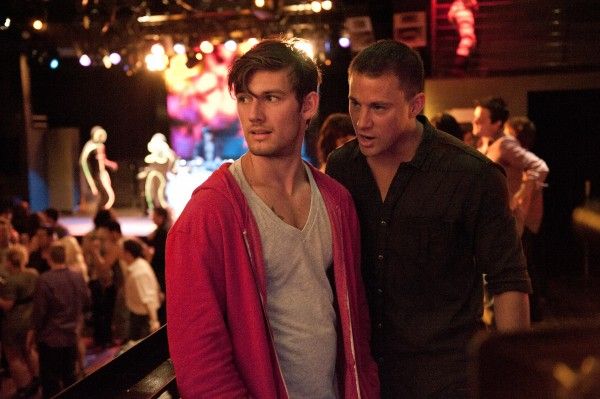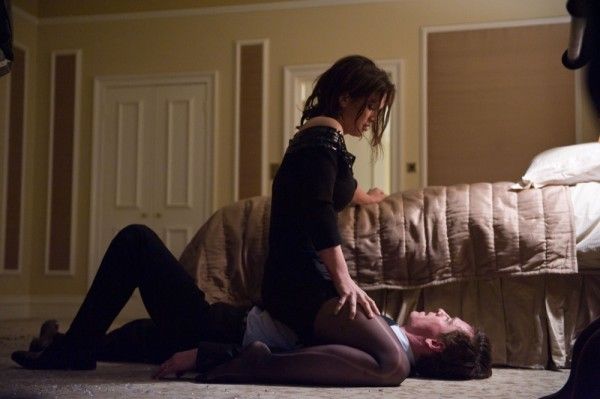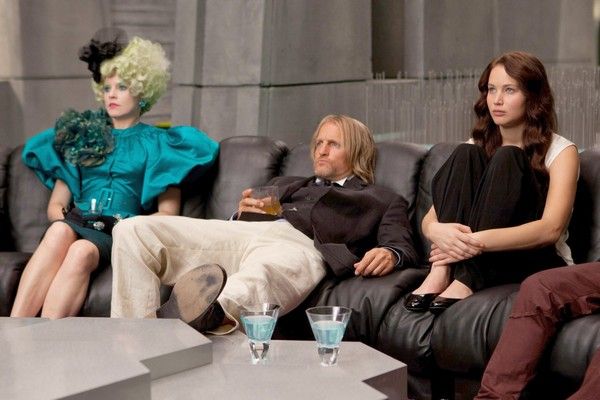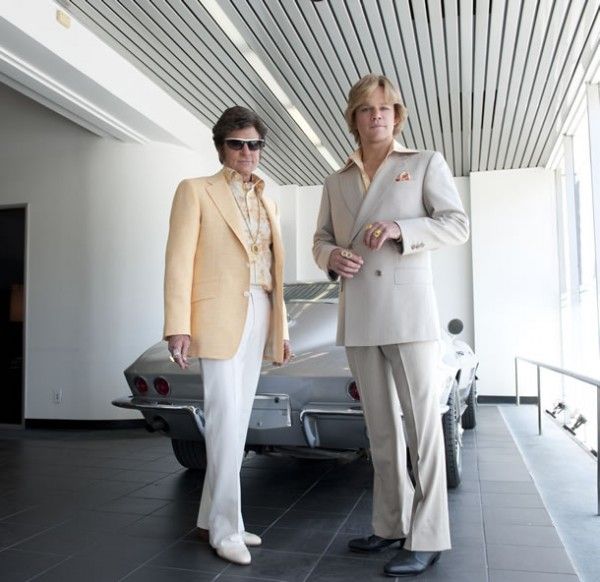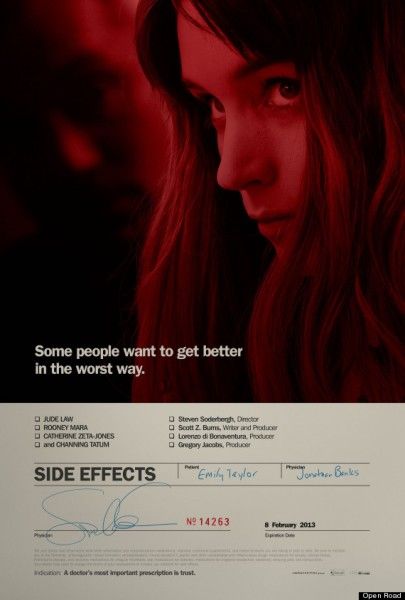While Steven Soderbergh has made a number of movies over the past few years, for whatever reason, I'd never had an opportunity to speak with him. So when I was offered a possible interview for his latest thriller, Side Effects, I sent an email saying I'd like to do it and figured it would never happen. Thankfully, I was wrong.At the Los Angeles press day, I was given 45 minutes with Soderbergh (he only does 45-minute interviews), and we talked about a wide variety of subjects like his his post-retirement plans, Twitter, comic book movies, his preferred digital camera, whether digital can ever match IMAX quality, 48fps, the success of Magic Mike and the sequel, his work as second unit director on The Hunger Games, championing Christopher Nolan before the world knew who he was, his filmmaking process, editing while shooting, why he cut 45 minutes out of Contagion and why you'll probably never see the footage, Kickstarter, and so much more. If you're a Soderbergh fan, I promise you'll dig this interview. Hit the jump to either read or listen to what he had to say.Click here for the audio, or the full transcript is below. Side Effects is now in theaters.Steve: I guess I have to start by saying I am a little mad at you and it’s because I’m a huge fan of your work and I have to say that I’m a little disappointed that you’re stepping away for who knows how long. So I speak for the fandom when I say I just want to express frustration.STEVEN SODERBERGH: Well, thank you. I don’t know what’s going to happen. Even if I were to start up again, I’ve already set things in motion that would delay that by a couple of years. So at the very least it’s going to be a few years and then we’ll see, we’ll see how I feel.To be honest though as a fan of yours I just want to you to be happy, but I’m disappointed as a fan because I want to see more movies.SODERBERGH: Right.But I understand that you want to do other things and I think I speak for most fans who just want you to be creative.SODERBERGH: Yeah, it’s just going to be different stuff. I don’t think I could ever sit still and do nothing. It’s just going to be different stuff. In the hopes that maybe by exploring some other avenues I can find another way in to this job and reboot somehow. It’s something I’ve been planning for a while and I get those feelings of I just know something’s got to change, so five years ago I decided pretty much to follow the plan that I followed.I’ve hear rumors about writing, painting, a whole bunch of stuff. Are you a proliferate painter?SODERBERGH: Not yet, I’ve painted a little. I’ve got a lot of work to do. You can’t get good at anything unless you do it day in and day out, over and over, so I’m just now getting to the point where I have enough time to practice. I’m in that phase of just trying to learn how to do very basic things that I’ve seen, that I like and it’s the same process as learning how to make a movie, you see something you like, you go out, you try to imitate it, you try to figure out how they did it, I mean, it’s going to take a while. It’s going to take a while. But I’ve got time, I’ve bought myself some time so it could be a while before I generate anything that I want to put out there. I’m putting up a website, maybe March or early April, and whatever I’m up to will be there or you’ll be able to know what it is. That will be my portal to the outside world.Does it have a URL yet?SODERBERGH: Extension765 I am a huge fan of the impressionist movement in the late 1800’s, is there a certain movement that you gravitate towards or are you a fan of all paintings?SODERBERGH: I think for now I like a lot of different- it’s like movies, I like a lot of different kinds of movies, I like a lot of different kinds of paintings. At this point I’ve been going back and forth between portraits and just pure abstract stuff. So I don’t know where that will lead, and then I’ve been doing collages. There’s going to be one book on filmmaking, one more book about filmmaking about a quarter of the way through now that I’ll put up on the site, when it’s done I’ll self-publish that. I’m going to do Scott’s play in the fall. I’m probably going to do Cleopatra on stage next year, I hope. So there’s stuff.Yeah, he mentioned he was doing something on Columbine.SODERBERGH: Yeah.That it’s very…SODERBERGH: Yeah, we had a read through in New York the day before Newtown, it was very weird. It’s a really interesting piece and when you say- if you were to say to somebody, “Oh, I’m doing a piece on Columbine.†When you see what it is, it’s not at all what you expect. He found a really fascinating avenue into it and it’s not about guns, it’s not about that debate, it’s about something else.We’re going to get into Side Effects of course, but I’m just curious about your take on the whole Kickstarter thing right now. I mean it’s a very, very exciting time for everything.SODERBERGH: Yeah. Look, what’s great about all this technology and things like Kickstarter is that it enables me, finally, and without any bad feeling at all, when people come up to me now saying, “I want to do this.†I can just go, “There are no excuses anymore.â€
I am a huge fan of the impressionist movement in the late 1800’s, is there a certain movement that you gravitate towards or are you a fan of all paintings?SODERBERGH: I think for now I like a lot of different- it’s like movies, I like a lot of different kinds of movies, I like a lot of different kinds of paintings. At this point I’ve been going back and forth between portraits and just pure abstract stuff. So I don’t know where that will lead, and then I’ve been doing collages. There’s going to be one book on filmmaking, one more book about filmmaking about a quarter of the way through now that I’ll put up on the site, when it’s done I’ll self-publish that. I’m going to do Scott’s play in the fall. I’m probably going to do Cleopatra on stage next year, I hope. So there’s stuff.Yeah, he mentioned he was doing something on Columbine.SODERBERGH: Yeah.That it’s very…SODERBERGH: Yeah, we had a read through in New York the day before Newtown, it was very weird. It’s a really interesting piece and when you say- if you were to say to somebody, “Oh, I’m doing a piece on Columbine.†When you see what it is, it’s not at all what you expect. He found a really fascinating avenue into it and it’s not about guns, it’s not about that debate, it’s about something else.We’re going to get into Side Effects of course, but I’m just curious about your take on the whole Kickstarter thing right now. I mean it’s a very, very exciting time for everything.SODERBERGH: Yeah. Look, what’s great about all this technology and things like Kickstarter is that it enables me, finally, and without any bad feeling at all, when people come up to me now saying, “I want to do this.†I can just go, “There are no excuses anymore.â€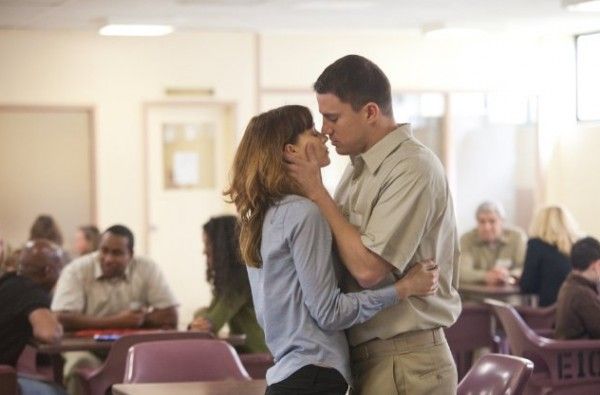 I’m waiting for the person, say a big filmmaker, who has a problem with the studio and needs say 50 million dollars, do you think it’s possible for someone to really put together this mega budget thing that the studios would never approve and actually get it going on Kickstarter? Do you think that will ever happen?SODERBERGH: I wouldn’t be surprised if we see that happen at some point on a scale that’s significant. I’m not even clear- now how does this work exactly? I put money into a Kickstarter thing, do I get it back?Basically when someone creates a Kickstarter, say it’s for 30 days, I believe that’s what it is, so say they want to target $100,000, everyone puts in money, until they reach the target you are committing to something that is not going to be taken, like a credit card will not be charged anything until they reach the target. Once they reach that target then the money gets funneled into the account they set up and I guess it’s like the honor system, like you’re just believing that they’re going to do what they say. From what I understand most people, most people, are pretty honest about this.SODERBERGH: Don’t they explain to you like, “Oh, if you put in this money, you’re going to get a shirtâ€?There are levels. It could be like $10, you get this, $50 you get this, and ultimately there will be a few that are very expensive that really give you a lot of VIP perks and that’s where they can really get ahead.SODERBERGH: But it’s mostly not designed to pay people back their money.No, it’s about getting something made; like a product or a film or a documentary.
I’m waiting for the person, say a big filmmaker, who has a problem with the studio and needs say 50 million dollars, do you think it’s possible for someone to really put together this mega budget thing that the studios would never approve and actually get it going on Kickstarter? Do you think that will ever happen?SODERBERGH: I wouldn’t be surprised if we see that happen at some point on a scale that’s significant. I’m not even clear- now how does this work exactly? I put money into a Kickstarter thing, do I get it back?Basically when someone creates a Kickstarter, say it’s for 30 days, I believe that’s what it is, so say they want to target $100,000, everyone puts in money, until they reach the target you are committing to something that is not going to be taken, like a credit card will not be charged anything until they reach the target. Once they reach that target then the money gets funneled into the account they set up and I guess it’s like the honor system, like you’re just believing that they’re going to do what they say. From what I understand most people, most people, are pretty honest about this.SODERBERGH: Don’t they explain to you like, “Oh, if you put in this money, you’re going to get a shirtâ€?There are levels. It could be like $10, you get this, $50 you get this, and ultimately there will be a few that are very expensive that really give you a lot of VIP perks and that’s where they can really get ahead.SODERBERGH: But it’s mostly not designed to pay people back their money.No, it’s about getting something made; like a product or a film or a documentary.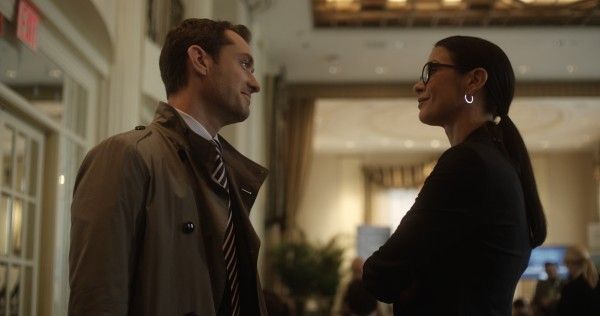 SODERBERGH: Right.I put in money for a really cool thing this British inventor made to help deactivate landmines; it’s like a plastic device, a big ball that can really save a lot of lives and for me that was worth my money. So I’m hoping it works out.SODERBERGH: Interesting. Look, like I said what I used to say to people all the time was, “Don’t wait for permission.†Now it’s shocking what you can make for nothing, you can make incredible looking shit now.Yeah.SODERBERGH: It’s great. That’s the good news, anybody can make something. The bad news is everybody is.I’m curious about digital cameras. Right now every director and cinematographer I talk to uses either the ARRI Alexa, the RED Epic, or recently the Sony F65, I’m curious your take on the digital cameras that are available right now.SODERBERGH: I have a long history with RED so I’m partial to RED. I like the way it looks, I like the way it works, I like its size. The Sony camera that’s a nice image, but the thing is a boat anchor. When I first saw the Panavision Genesis I knew that wasn’t going to work because it was bigger than a Panaflex. The whole point is we want it smaller. The thing about the Epic, which can record full resolution without being connected to anything, you know, we have that shot in Side Effects where Rooney puts her foot on the gas, I just stripped everything off the body and stuck the camera behind the gas pedal. Normally you’d have to saw a hole in the car to get that shot. That’s the shit I want. I want to be able to put it wherever I want. That combined with the sort of ethos of that company, which is that they are constantly upgrading. They’ve got a new sensor coming out, the Dragon, that’s fucking insane, like it’s a whole other level in terms of dynamic range, resolution, it’s crazy. I’ve seen the tests on it, it’s nuts. These guys just stay up really late and they’re just never satisfied and they’re constantly pushing it. So I look at it as…if you’re conservative you should probably use something other than the RED, if you’re someone who likes to live dangerously and push stuff then you should be using the RED because that’s where it’s at its best. A lot of these cameras, you use them and they have text there saying, “Don’t do that. Don’t do that.†Whereas with RED we’ll shoot stuff that will come back, Jim Jannard will look at it and go, “Wow, I didn’t know somebody was going to do that with our camera. Great, lets figure out how to turn what most people would look at as a problem into our next firmware upgrade.†They’re just constantly tweaking. And it’s a great story too because its him, he’s like Howard Hughes; he had the idea, he had the money, he put the super group together, they went and did it and that’s the way innovation happens, you know what I mean? And he’s a gearhead, he’s a camera guy. A lot of these things you look at and you go, “Clearly the people who designed this have never had to use one of these.†Because if you knew you were going to put that on your shoulder you wouldn’t design it that way. Jim was a photographer. He really canvased a lot of people and said, “What do you want? What do you want in this?†And literally talked about how big should it be? How much should it weigh? What should it look like? What should the weight distribution be? What kind of lens masks do you want? He was trying to make something that you could use with your hands that felt intuitive. So I’m really happy that I ended up being a part of that narrative of the development of that camera because it was exciting to watch and the product itself has completely changed the way that I’ve been able to work. My only regret is I wish I had it ten years ago.When do you think digital cameras are going to hit the resolution or the ability that anyone using film is going to say, “It’s time to switchâ€?SODERBERGH: They’ve already done it. Film people are just in denial.  They’ve already done it. They passed them a couple years ago.Okay, let me ask you this question, when do you think digital cameras will get to doing what IMAX can do, if ever?SODERBERGH: Oh, they will. I mean the new Dragon 6k is crazy. Take the new Dragon sensor, put a Master Prime on it, shoot it at a decent F-stop, and do a line pairs test where you have this chart that has a series of lines on it…and let’s see.Because I don’t know the resolution of the Dragon sensor versus what the RED Epic is doing right now, is it like 50% better? Is it 20%? Is it 100%?SODERBERGH: I don’t know, it’s a lot. It’s noticeable.I’m wonder if Mr. Jackson is going to shoot with that when he does the additional photography on The Hobbit.SODERBERGH: I don’t know, if you were going to blend, I don’t think he would want to blend it with the Epic. I don’t know. I mean, Peter’s off on a frolic of his own.While we’re talking about this, I definitely want to know your take, if you don’t mind talking about it, on the high frame rate that Peter’s doing.SODERBERGH: There’s a technical reason why I think that frame rate is weird and it has to with your brain’s ability to scan beyond a certain rate. The point is I find it looks weird. There was an article written a couple months ago by a neuroscientist explaining why it is always going to look weird. Your brain is never going to rewire to have this look “normal†because beyond a certain frame rate you lose the ability to take it all in. So it’s always going to look like video, it’s never not. And I find that weird.I saw it twice, once at Warner Bros. and once in IMAX and I found the IMAX presentation to be much better, but I’m curious if the high frame rate might be more applicable towards documentaries, because it really is taking the glass out of the window. I’m not sold on it, but I’m also not against it. I think its maybe more applicable for certain genres.SODERBERGH: Yeah, maybe. It interferes with my suspension of disbelief is my personal issue.I think that there were certain sequences in The Hobbit, for me, where it did the same thing and others where I found it very compelling. Switching back, let’s jump into your movie now. Originally Scott was trying to make this as his directorial debut.SODERBERGH: No, he’s made a movie before.My bad, he wanted to direct this and he was explaining to me how you really liked the script. Was it weird for you, because you’re very close to him? What was that conversation like? Because he’s been trying for a while.SODERBERGH: It seemed to not be that big a deal in the sense that I called him right after The Man from U.N.C.L.E. blew up and I just said, “I really wanted to work with you this spring. I won’t ask you again, but can I have Side Effects?†And he said, “Yeah†and then we kind of never talked about it again. I think it would have been weird if we didn’t have the history that we have, you know what I mean? We’ve worked together twice before, three times before, we worked together on the U.N.C.L.E. movie for a year. I think if it had been someone else it probably would have been a more difficult decision for him than it was, but it seemed, you know, he knew how much I liked it and I think he felt, “Yeah let’s just go do it.†He’s one of these guys; he’s got tons of ideas. His attitude was, “I’ll write something else.†He does. He’s very prolific and very facile so I don’t think he had, he didn’t exhibit any of the proprietary attitude that a lot of writers would have. I think he felt like, “I got other stuff.â€How much do you change scripts based on actor’s involvement? Because a lot of actor will come to the plate and then say, “Okay, I want to do this, but I want to make this dramatic change to the arc.†Over the course of your history, how much have you adjusted your films for an actor? Or is each project is different?SODERBERGH: It depends, yeah. It really depends on the project. Sometimes there’s a lot of work to be done and it’s great to have somebody come in with a different perspective. I’ve been in a situation where I’ve gone to an actor with a script and they’ve said, “I like the project but I don’t think this character is working.†And we’ve gone off and worked with another actor who said, “I want to do the movie but I think there’s work to be done on the character.†They’ve worked with us and then bailed on the movie and then I went back to the original actor and they said, “You’ve solved it, I’m in†That’s happened to me before.Â
SODERBERGH: Right.I put in money for a really cool thing this British inventor made to help deactivate landmines; it’s like a plastic device, a big ball that can really save a lot of lives and for me that was worth my money. So I’m hoping it works out.SODERBERGH: Interesting. Look, like I said what I used to say to people all the time was, “Don’t wait for permission.†Now it’s shocking what you can make for nothing, you can make incredible looking shit now.Yeah.SODERBERGH: It’s great. That’s the good news, anybody can make something. The bad news is everybody is.I’m curious about digital cameras. Right now every director and cinematographer I talk to uses either the ARRI Alexa, the RED Epic, or recently the Sony F65, I’m curious your take on the digital cameras that are available right now.SODERBERGH: I have a long history with RED so I’m partial to RED. I like the way it looks, I like the way it works, I like its size. The Sony camera that’s a nice image, but the thing is a boat anchor. When I first saw the Panavision Genesis I knew that wasn’t going to work because it was bigger than a Panaflex. The whole point is we want it smaller. The thing about the Epic, which can record full resolution without being connected to anything, you know, we have that shot in Side Effects where Rooney puts her foot on the gas, I just stripped everything off the body and stuck the camera behind the gas pedal. Normally you’d have to saw a hole in the car to get that shot. That’s the shit I want. I want to be able to put it wherever I want. That combined with the sort of ethos of that company, which is that they are constantly upgrading. They’ve got a new sensor coming out, the Dragon, that’s fucking insane, like it’s a whole other level in terms of dynamic range, resolution, it’s crazy. I’ve seen the tests on it, it’s nuts. These guys just stay up really late and they’re just never satisfied and they’re constantly pushing it. So I look at it as…if you’re conservative you should probably use something other than the RED, if you’re someone who likes to live dangerously and push stuff then you should be using the RED because that’s where it’s at its best. A lot of these cameras, you use them and they have text there saying, “Don’t do that. Don’t do that.†Whereas with RED we’ll shoot stuff that will come back, Jim Jannard will look at it and go, “Wow, I didn’t know somebody was going to do that with our camera. Great, lets figure out how to turn what most people would look at as a problem into our next firmware upgrade.†They’re just constantly tweaking. And it’s a great story too because its him, he’s like Howard Hughes; he had the idea, he had the money, he put the super group together, they went and did it and that’s the way innovation happens, you know what I mean? And he’s a gearhead, he’s a camera guy. A lot of these things you look at and you go, “Clearly the people who designed this have never had to use one of these.†Because if you knew you were going to put that on your shoulder you wouldn’t design it that way. Jim was a photographer. He really canvased a lot of people and said, “What do you want? What do you want in this?†And literally talked about how big should it be? How much should it weigh? What should it look like? What should the weight distribution be? What kind of lens masks do you want? He was trying to make something that you could use with your hands that felt intuitive. So I’m really happy that I ended up being a part of that narrative of the development of that camera because it was exciting to watch and the product itself has completely changed the way that I’ve been able to work. My only regret is I wish I had it ten years ago.When do you think digital cameras are going to hit the resolution or the ability that anyone using film is going to say, “It’s time to switchâ€?SODERBERGH: They’ve already done it. Film people are just in denial.  They’ve already done it. They passed them a couple years ago.Okay, let me ask you this question, when do you think digital cameras will get to doing what IMAX can do, if ever?SODERBERGH: Oh, they will. I mean the new Dragon 6k is crazy. Take the new Dragon sensor, put a Master Prime on it, shoot it at a decent F-stop, and do a line pairs test where you have this chart that has a series of lines on it…and let’s see.Because I don’t know the resolution of the Dragon sensor versus what the RED Epic is doing right now, is it like 50% better? Is it 20%? Is it 100%?SODERBERGH: I don’t know, it’s a lot. It’s noticeable.I’m wonder if Mr. Jackson is going to shoot with that when he does the additional photography on The Hobbit.SODERBERGH: I don’t know, if you were going to blend, I don’t think he would want to blend it with the Epic. I don’t know. I mean, Peter’s off on a frolic of his own.While we’re talking about this, I definitely want to know your take, if you don’t mind talking about it, on the high frame rate that Peter’s doing.SODERBERGH: There’s a technical reason why I think that frame rate is weird and it has to with your brain’s ability to scan beyond a certain rate. The point is I find it looks weird. There was an article written a couple months ago by a neuroscientist explaining why it is always going to look weird. Your brain is never going to rewire to have this look “normal†because beyond a certain frame rate you lose the ability to take it all in. So it’s always going to look like video, it’s never not. And I find that weird.I saw it twice, once at Warner Bros. and once in IMAX and I found the IMAX presentation to be much better, but I’m curious if the high frame rate might be more applicable towards documentaries, because it really is taking the glass out of the window. I’m not sold on it, but I’m also not against it. I think its maybe more applicable for certain genres.SODERBERGH: Yeah, maybe. It interferes with my suspension of disbelief is my personal issue.I think that there were certain sequences in The Hobbit, for me, where it did the same thing and others where I found it very compelling. Switching back, let’s jump into your movie now. Originally Scott was trying to make this as his directorial debut.SODERBERGH: No, he’s made a movie before.My bad, he wanted to direct this and he was explaining to me how you really liked the script. Was it weird for you, because you’re very close to him? What was that conversation like? Because he’s been trying for a while.SODERBERGH: It seemed to not be that big a deal in the sense that I called him right after The Man from U.N.C.L.E. blew up and I just said, “I really wanted to work with you this spring. I won’t ask you again, but can I have Side Effects?†And he said, “Yeah†and then we kind of never talked about it again. I think it would have been weird if we didn’t have the history that we have, you know what I mean? We’ve worked together twice before, three times before, we worked together on the U.N.C.L.E. movie for a year. I think if it had been someone else it probably would have been a more difficult decision for him than it was, but it seemed, you know, he knew how much I liked it and I think he felt, “Yeah let’s just go do it.†He’s one of these guys; he’s got tons of ideas. His attitude was, “I’ll write something else.†He does. He’s very prolific and very facile so I don’t think he had, he didn’t exhibit any of the proprietary attitude that a lot of writers would have. I think he felt like, “I got other stuff.â€How much do you change scripts based on actor’s involvement? Because a lot of actor will come to the plate and then say, “Okay, I want to do this, but I want to make this dramatic change to the arc.†Over the course of your history, how much have you adjusted your films for an actor? Or is each project is different?SODERBERGH: It depends, yeah. It really depends on the project. Sometimes there’s a lot of work to be done and it’s great to have somebody come in with a different perspective. I’ve been in a situation where I’ve gone to an actor with a script and they’ve said, “I like the project but I don’t think this character is working.†And we’ve gone off and worked with another actor who said, “I want to do the movie but I think there’s work to be done on the character.†They’ve worked with us and then bailed on the movie and then I went back to the original actor and they said, “You’ve solved it, I’m in†That’s happened to me before. 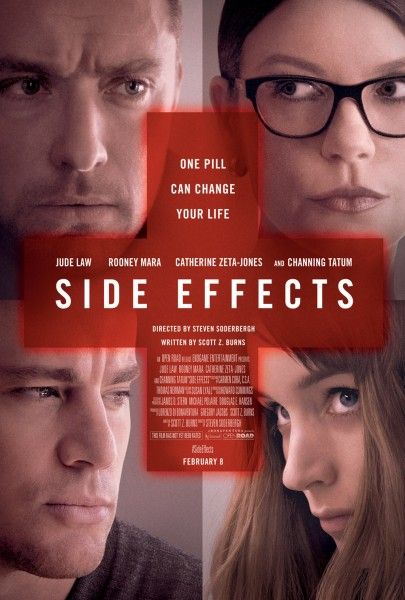 It really depends on the piece and I think in the last few years there’s been less of that because I think the scripts, from the get-go, have been more done. You’ll have actors coming in who will have a lot of questions about things to make sure that they’re in line with what we’re intending, but in the last few years the scripts have been in pretty good shape by the time we started casting. Me and the writer have kind of beaten it death and there wasn’t a lot of room for somebody coming in and rethinking the character. Now having said that, in post on Contagion we did a lot of work and ended up going back and doing a week of reshooting to accommodate a version of the movie that was created in the editing room that was very different from the script. So that was an interesting circumstance because we had a movie that wasn’t working at the length that we shot it and then we did a really radical 90 minute cut that solved a lot of problems, but in order to work it needed some connective tissue. So we went and shot stuff to make the 90 minute version work. That was a pretty dramatic overhaul in post. Obviously I’m the one sort of saying to Scott “This is what I think we should be doing, look at this cut, I think we need scenes, I think we need to re-do these scenes, and we need scenes that connect here to here to here.†Typically if you’re going to be talking to the actors it’s more explaining why you’re doing what you’re doing than to solicit input and so that’s a lot different than…god, I remember we had like a week of rehearsal on Sex, Lies, and Videotape and now I think, “God, what did we talk about for a week?†That’s the only time I think I’ve ever felt on a set that we had all the time in the world, where I never felt under any time constraints at all. Because I think of that movie now we had 30 days, I could shoot that thing in 12 days now. I just remember just sitting there, which was fine, it was a cheap movie anyway; I think we had 10 people on the crew.
It really depends on the piece and I think in the last few years there’s been less of that because I think the scripts, from the get-go, have been more done. You’ll have actors coming in who will have a lot of questions about things to make sure that they’re in line with what we’re intending, but in the last few years the scripts have been in pretty good shape by the time we started casting. Me and the writer have kind of beaten it death and there wasn’t a lot of room for somebody coming in and rethinking the character. Now having said that, in post on Contagion we did a lot of work and ended up going back and doing a week of reshooting to accommodate a version of the movie that was created in the editing room that was very different from the script. So that was an interesting circumstance because we had a movie that wasn’t working at the length that we shot it and then we did a really radical 90 minute cut that solved a lot of problems, but in order to work it needed some connective tissue. So we went and shot stuff to make the 90 minute version work. That was a pretty dramatic overhaul in post. Obviously I’m the one sort of saying to Scott “This is what I think we should be doing, look at this cut, I think we need scenes, I think we need to re-do these scenes, and we need scenes that connect here to here to here.†Typically if you’re going to be talking to the actors it’s more explaining why you’re doing what you’re doing than to solicit input and so that’s a lot different than…god, I remember we had like a week of rehearsal on Sex, Lies, and Videotape and now I think, “God, what did we talk about for a week?†That’s the only time I think I’ve ever felt on a set that we had all the time in the world, where I never felt under any time constraints at all. Because I think of that movie now we had 30 days, I could shoot that thing in 12 days now. I just remember just sitting there, which was fine, it was a cheap movie anyway; I think we had 10 people on the crew.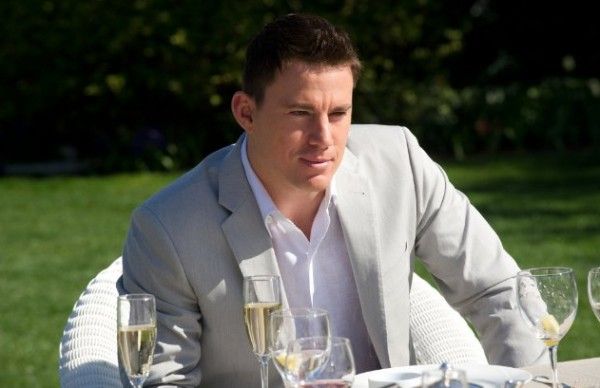 Oh, how times have changed.SODERBERGH: Yeah, I know.Clint Eastwood likes two takes, if you’re lucky, Fincher likes 50; where do you fall on that scale?SODERBERGH: It depends. I fall mostly towards the lets keep it fresh, 3 is my ideal, but there was one scene that ended up getting cut significantly, I’m only using the front part of it now, in Side Effects where it was a long dialogue scene that I wanted to play out in one shot and there was a lot of movement in it so there was like seven different destinations for the camera. We did 23 takes before we got it. If that’s what it requires, I’ll do it, but in general if there’s not a big technical thing going on, I feel like unless there’s something wrong with the text or the actor, 3 takes and we ought to be thinking of moving on.I don’t know what the final running time is on Side Effects, what is it?SODERBERGH: I think total with credits, 105 minutes.
Oh, how times have changed.SODERBERGH: Yeah, I know.Clint Eastwood likes two takes, if you’re lucky, Fincher likes 50; where do you fall on that scale?SODERBERGH: It depends. I fall mostly towards the lets keep it fresh, 3 is my ideal, but there was one scene that ended up getting cut significantly, I’m only using the front part of it now, in Side Effects where it was a long dialogue scene that I wanted to play out in one shot and there was a lot of movement in it so there was like seven different destinations for the camera. We did 23 takes before we got it. If that’s what it requires, I’ll do it, but in general if there’s not a big technical thing going on, I feel like unless there’s something wrong with the text or the actor, 3 takes and we ought to be thinking of moving on.I don’t know what the final running time is on Side Effects, what is it?SODERBERGH: I think total with credits, 105 minutes.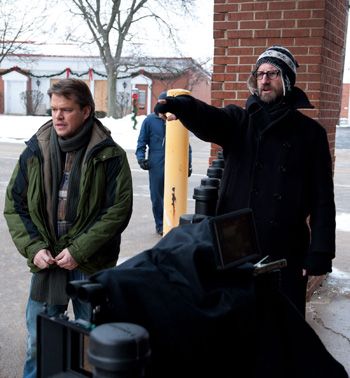 What was your assembly cut?SODERBERGH: Two hours.Oh, OK.SODERBERGH: So it wasn’t too long.So there’s not a lot of deleted scenes?SODERBERGH: There are but a lot of them are scenes- there’s some, you’d be surprised how many, but a lot of them just…it’s that trial and error thing where people are ahead of us. They’ll make that leap that he goes from here to here. A lot of it though what you would find is scenes that I just, like I said, I cut the entire back 2/3 off or I cut the entire front 2/3 off. There was a lot of hacking, just like, literally I don’t need the first 2/3 of that scene, I can just come in on that line. There was a lot of that in the last edit I did. I really got a lot aggressive about that kind of stuff, as did Scott. Scott would send me notes going, “We don’t need that. You can get out here and go right from there to there.†So that’s the fun part.
What was your assembly cut?SODERBERGH: Two hours.Oh, OK.SODERBERGH: So it wasn’t too long.So there’s not a lot of deleted scenes?SODERBERGH: There are but a lot of them are scenes- there’s some, you’d be surprised how many, but a lot of them just…it’s that trial and error thing where people are ahead of us. They’ll make that leap that he goes from here to here. A lot of it though what you would find is scenes that I just, like I said, I cut the entire back 2/3 off or I cut the entire front 2/3 off. There was a lot of hacking, just like, literally I don’t need the first 2/3 of that scene, I can just come in on that line. There was a lot of that in the last edit I did. I really got a lot aggressive about that kind of stuff, as did Scott. Scott would send me notes going, “We don’t need that. You can get out here and go right from there to there.†So that’s the fun part.
continued on PAGE 2
With all of your movies, what is the one or two that have the most deleted scenes?
SODERBERGH: Proportionally, Contagion had the most material that was shot and cut and never made the movie. There’s 45 minutes of cut material that’s gone.
I apologize for not know, is that material available on the Blu-ray? Will it ever see the light of day?
SODERBERGH: No, I’ve sort of gone the other way. I feel like all the people who went back and fucked around with their movies from the 70’s made them worse. So I kind of feel like that’s the movie, that’s it.
I’ll get specific and say Lucas, and I think the reason most fans are angry at him is that he never offered the original version, and that is ultimately the problem. If you want to fuck with your movie, if you want go ahead and edit, more power to you, but give me the original version. So, for example, on Contagion, as a fan of yours I would love to see this alternate version just to see it, but as long as the other version is there then I’m fine.
SODERBERGH: Part of me is like, I don’t really know if it’s fair to the actors, the stuff that didn’t make it. I used to be fine with it and then I just suddenly wasn’t. [Laughs]
You are like Guillermo (del Toro), in terms of you both edit as you’re shooting. When did you first start editing as you were shooting?
SODERBERGH: As soon as I started working with an editor, they would be editing while we were shooting. It’s horrifying now to think that the first three films that I made, that I cut myself, I didn’t start editing until we wrapped. That’s unbelievable. What’s changed is the ability to start editing two hours after you’ve wrapped the set. That’s what’s really been the huge difference for me. The ability, that night, to cut that days stuff and make decisions about whether or not we got it and adjust accordingly if necessary, that’s been gigantic.
I have a whole bunch of things I want to ask you about. A few people, a few filmmakers, asked me to ask you, are you Bitchuation on Twitter?
SODERBERGH: Yeah.
OK, have confirmed that yet to anyone else?
SODERBERGH: I think Rich Eisen confirmed that.
OK.
SODERBERGH: Yeah.
I don’t think you tweet enough.
SODERBERGH: Here’s the thing, I have rules about that, which is I’m not there to sell anything. What will happen, it’s going to be streaky, what will happen is I build up a bunch of stuff and blow it out all at the same time. I don’t know if that’s the way you’re supposed to do it, but that’s the way it’s happening. I’m about a week away from another burst of tweets. It’s fun to have, it’s kind of like having a pseudonym, it’s kind of like being Peter Andrews, I feel I can hide behind that, which is fun.
Speaking of pseudonyms where did Mary Ann Bernard come from?
SODERBERGH: That’s my mother’s maiden name.
I apologize for not knowing that, I probably should have.
SODERBERGH: Not many people do.
I always do a lot of research; I should have picked up on that.
SODERBERGH: It’s funny, people focus more on the cinematography for some reason, I don’t know.
You recently offered to edit The Canyons in 72 hours and I guess they said no, am I wrong about this?
SODERBERGH: That…god…All I will say is that it seemed to me that there was no upside in that conversation ever being known outside of the room and that I was stunned when it went out of the room.
That probably sums up that movie though, that movie is loaded with issues.
SODERBERGH: It sure seemed like a dramatic production.
Right.
SODERBERGH: But, no, I know Paul [Schrader], I like Paul, I just never would have anticipated that any conversation about that would ever go outside the room.
Are you a little stunned at the huge success of Magic Mike?
SODERBERGH: Yeah, those numbers were significantly higher than anything we hoped for; they were significantly higher than the numbers that were going to make it work for Warners, for instance. Their buying North America for the amount of money that they paid was predicated on the movie doing like 60, if the movie does 60 we’re gold, so to just fly past that, it was fun because it was so atypical. Even the way it performed was really weird day to day during the week. Danny Fellman, the head of distribution at Warner Brothers would just laugh because, this thing there are just no comps for the way this thing is performing. It’s so weird, just the shifts from day to day during the week. We were trying to figure out is it because women during the week they can babysitters on these days and not those? Certain days would be huge then the next day would be nothing. It was just all over the place. But it’s really fun when the surprise goes in that direction.Â
What was weird was- my experience has been that tracking is very strange; it tends to be very accurate about when things are going to underperform, it tends not to be very accurate and sometimes wildly inaccurate when things over perform, and Magic Mike was the perfect example. According to the tracking we should have opened to 19, and we opened at 38, or whatever. So if I were at Warners and I show up Monday morning I would be talking to those people who do my tracking and saying, “How did we miss by 100%?†If I have a department that’s supposed to be tracking, like, where were those people? Why can’t you find out?
What I’ve been noticing lately, and I’m not the guy for tracking, but I’ve found that on Friday night, the reaction on Facebook and twitter to your movie is huge, because at 9:00 if everyone getting back form the movies is raving about it, the next two days are going to be huge, and if people are like, “This movies not good†then all the sudden it goes like this. So maybe that is playing into it.
SODERBERGH: I guess so.Â
People really liked the movie.
SODERBERGH: What’s interesting to me is so, your methodology for figuring out who wants to see it and who doesn’t has obviously got a gigantic hole in it because you’re not reaching everybody that you have to reach to have relevant data. If you miss by 100%, that’s a lot. But like I said, it tends to be very accurate when shit’s going to not perform. For instance, the flipside of that is Haywire, we knew Tuesday we were going to have a terrible weekend, and we did.
I have to tell you I really dig that movie.
SODERBERGH: I was really happy with it and we felt like it was a fun ride, but couldn’t pay people to go see it.
It is a really good movie and she is really good. You did second unit on The Hunger Games, I don’t know if you talked a lot about that, but how did you get involved in that?
SODERBERGH: Well, Gary’s a friend of mine; I’ve known him a long time. At one point, actually, in the mid-90’s I was crashing on his couch for three weeks. We just have a history of helping each other out on stuff, I show him everything, I was a producer on Pleasantville. So we just have a long history of kind of doing each other solids when one of us needs help. So he called me in April and said, “I’m looking at the board of Hunger Games and I’ve got these two days of second unit at the end of August, what are you doing? Can you come down? I’ve got to get somebody I trust to do this, would you be interested?†So I said, “Yeah, actually Contagion will be done and we won’t have started Magic Mike, it’s actually perfect. I can literally just fly in and do it.†What I found really nerve-wracking about it was shooting and really worrying am I getting what he needs? Am I getting what he wants? When imp shooting my own stuff I look at it and I go, “OK, I’ve got it, I need this, I got that.†Here he’s off with the first unit, I’m here, I want to deliver for my friend what he needs. I found that aspect of it- I was very anxious that I was getting everything that he needed and wanted.Â
The fun part of it was my job there was to recreate exactly the aesthetic that he and Tom Stern have set up in terms of framing, and lighting, and movement. I’m there to be a chameleon and duplicate that so that it’s seamless. And I love that, I love kind of submitting to that and following their rules. So we went down, we shot a ton of shit, it was really fun and then I didn’t hear from him and I’m like, “Oh, no.†Finally two weeks later he emailed me and he goes, “I just realized I don’t think I ever responded.†He goes, “I’m so happy with the stuff. Thank you.†And I went, “Oh god, dude, you had me completely flipped out, I thought I was going to read that you had to redo it.†He’s like, “No, no, no it all worked out great.†So it was fun, it was a tough show. I was really happy that the movie took off because he worked really hard on it. It was a tough show. I totally understood him feeling like “I don’t want to go back and do that againâ€, because I would have felt the same.
You’re probably the most qualified second unit director of the last decade.
SODERBERGH: It was fun.
I want to jump back real quick to Magic Mike, Channing has talked about doing a sequel and possibly directing it himself. Obviously you’re going to go and do your own thing but if he were to call you and say, “Hey, I’m doing a sequel†would you produce? Is that something you would be willing to do?
SODERBERGH: Yeah, I’m happy to be conciliary, there’s absolutely another movie to be made out of that. There were a lot of ideas that didn’t make it to the first one that we’ve had discussions about here’s an opportunity to some of these things that we couldn’t get into the first one. Like there’s a lot of stuff still there, stories of shit that happened to him that we just didn’t have time for. So I hope they do it. I’ll help in whatever way I can, I just don’t want to be involved day-to-day. But I’m happy to in a sense be an executive producer and kind of weigh in on stuff. We had a great time making that movie and I don’t have a desire to try and go back and try and recreate it.
You produced Insomnia, you produced Pleasantville, you produced a lot of movies; what is your typical involvement as a producer? Are you very hands on day-to-day? Or are you involved in the pre-production?
SODERBERGH: Depends, it depends on the filmmaker, depends on the scale of the movie, I’m sort of keying off what I think people need from me. In the case of Insomnia, he doesn’t need me around, I went to the set one day, literally, just to say hello to everyone and then flew back home. All Chris [Nolan] needed was to get in the fucking door, that was the problem was that the head of the studio at that point didn’t understand why George [Clooney] and I were so lit up about him and I had to go in and go, “You need to give this guy this job. This is good for you.†Once that happened, once he was on, it was literally, “I’ll see you when you’re done.†He doesn’t need help like that. Other people want you to watch everything, it just depends.
Does Chris ever send you thank you card? [Laughs]
SODERBERGH: No, he and I will try to have lunch like once a year, catch up, you know what I mean? He’s been very vocal about, “I’m so glad I got on that movie because it started the relationship with this studio that turned out to be great for everybody,†and I’m happy because it proved that the sort of mandate that we had at Section 8 of taking interesting, young, independent filmmakers and getting them onto movies that typically would be kind of normal if they weren’t involved, they elevate it, they make it something more distinctive by being involved. That was our whole idea. It’s what I did. I was an independent person and I came in and started working with studios on certain movies. There was this whole wave of people like David O. Russell. that was our whole idea, blend these two things. Why can’t independent filmmakers make shit that opens in 3000 theaters? So I’m glad that that all played out because Chris the perfect example of why that can work and also from the studio standpoint my belief is that you should bet horses not races. You should be developing relationships with talent not based on specific projects but based on the fact that you think they’re talented and that everybody hits and misses but in the long run, it’s like the Clint thing, in the long run you win. If you look at my career, if one person had financed everything I’ve ever made, you’d be up. I’ve had peaks and valleys, but over the long term if you paid for all of them you would have won. That’s why it’s very satisfying to watch his career turn into the career that it’s turned into, because he clearly- it wasn’t a surprise to me, he clearly had that in him. They just, initially, couldn’t see it.
It’s interesting about him because I did a set visit on Dark Knight Rises and I watched him work, not super close, but close and he’s one of the few filmmakers that will watch over his DPs shoulder and not look at playback, which I find fascinating because every other film set I’ve been on people are watching playback.
SODERBERGH: Yeah, on Out of Sight I started getting rid of that stuff because I felt it was pulling the energy away from where it needs to be.
But you’re shooting a lot of your stuff.
SODERBERGH: Yeah, but even when I wasn’t I was doing the same thing because the actor needs to feel like I’m there and this is where things are happening, not at video village, this is where were making the movie, here. So what ends up happening now is there’s a single monitor and the focus puller works from, because now with digital, you need to be shooting wide open all the time, that’s how it looks the best, so your depth of field is like this, and so your focus-puller has the 27 inch with his face two inches from the screen with the remote thing making sure, you can imagine on a Fincher set the pressure that guys under.
No, I couldn’t be that guy. There is no way. You’re next film, if you will, is with Michael Douglas and Matt Damon all of us are very excited about, we all want to see it, what is the length of that one?
SODERBERGH: It’s like 1:50; it’s under 2:00.
What was it like making that story?
SODERBERGH: Fun, really fun, because it had a lot of meaning for all of us by the time it happened because it was Michael and Matt, it was for whatever period of time it’s the last thing that I’m going to do and we had to postpone it because Michael got sick. So getting to do it meant a lot by the time we got there and so it was really fun. The good thing, as stupid as it sounds to talk about, whatever this break is that I’m on, it was great knowing that that was the last one for a while because I really appreciated everything about it every day, in a way that you never would if you had something coming up nine months later. I really was able to kind of- you know, the people that I work with are my crew, like Greg Jacobs, I got an opportunity to know like this is the last time that I’m going to see these people for a while. That made it nice, to know that instead of suddenly you just disappear and everybody’s like, “what happened?†I was able to express my appreciation to people because I knew this was going to be it for a while.
What are the one or two projects that you really wanted to do that just couldn’t come together for financing, cast, whatever, is there one or two?
SODERBERGH: There are only a couple; the things that I was trying to make that I didn’t get to make, Confederacy [of Dunces], Moneyball, Man from U.N.C.L.E.
That’s a pretty small list.
SODERBERGH: Yeah it is, considering what we did get to make.
Yeah.
SODERBERGH: Those are the only three that come to mind of I thought they were going to get made.Â
The comic book genre seems to be the most popular thing on the planet right now, is that something that appealed to you at one point? Or not even a little?
SODERBERGH: I just wasn’t a comic book guy. When the Russos were going after the captain America sequel, they called me and said, “Will you call Marvel and talk to them about us?†because I have a relationship with them. I said, “Tell me why you want to do this.†And they go, “Because we have a $60,000 comic book collection, because we’re obsessed with this shit.†And I went, “OK, I’m just checking.†Because I’m not, that’s why I can’t do one, but I didn’t know that and I just wanted to make sure that they were going after it for the right reasons as it turned out they were and they ended up getting the job and they’ll do a great job because they love it, and I’m just not the guy.


